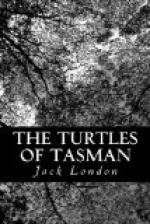His next store was established on Adeline Street, where lived a comfortable, salaried class. Here, his shelves carried a higher-grade and a more diversified stock. By the same old method, he drew his crowd. He established a delicatessen counter. He dealt directly with the farmers, so that his butter and eggs were not only always dependable but were a shade better than those sold by the finest groceries in the city. One of his specialties was Boston baked beans, and so popular did it become that the Twin Cabin Bakery paid him better than handsomely for the privilege of taking it over. He made time to study the farmers, the very apples they grew, and certain farmers he taught how properly to make cider. As a side-line, his New England apple cider proved his greatest success, and before long, after he had invaded San Francisco, Berkeley, and Alameda, he ran it as an independent business.
But always his eyes were fixed on Broadway. Only one other intermediate move did he make, which was to as near as he could get to the Ashland Park Tract, where every purchaser of land was legally pledged to put up no home that should cost less than four thousand dollars. After that came Broadway. A strange swirl had come in the tide of the crowd. The drift was to Washington Street, where real estate promptly soared while on Broadway it was as if the bottom had fallen out. One big store after another, as the leases expired, moved to Washington.
The crowd will come back, Josiah Childs said, but he said it to himself. He knew the crowd. Oakland was growing, and he knew why it was growing. Washington Street was too narrow to carry the increasing traffic. Along Broadway, in the physical nature of things, the electric cars, ever in greater numbers, would have to run. The realty dealers said that the crowd would never come back, while the leading merchants followed the crowd. And then it was, at a ridiculously low figure, that Josiah Childs got a long lease on a modern, Class A building on Broadway, with a buying option at a fixed price. It was the beginning of the end for Broadway, said the realty dealers, when a grocery was established in its erstwhile sacred midst. Later, when the crowd did come back, they said Josiah Childs was lucky. Also, they whispered among themselves that he had cleared at least fifty thousand on the transaction.
It was an entirely different store from his previous ones. There were no more bargains. Everything was of the superlative best, and superlative best prices were charged. He catered to the most expensive trade in town. Only those who could carelessly afford to pay ten per cent. more than anywhere else, patronised him, and so excellent was his service that they could not afford to go elsewhere. His horses and delivery wagons were more expensive and finer than any one else’s in town. He paid his drivers, and clerks, and bookkeepers higher wages than any other store could dream of paying. As a result, he got more efficient men, and they rendered him and his patrons a more satisfying service. In short, to deal at Childs’ Cash Store became almost the infallible index of social status.




